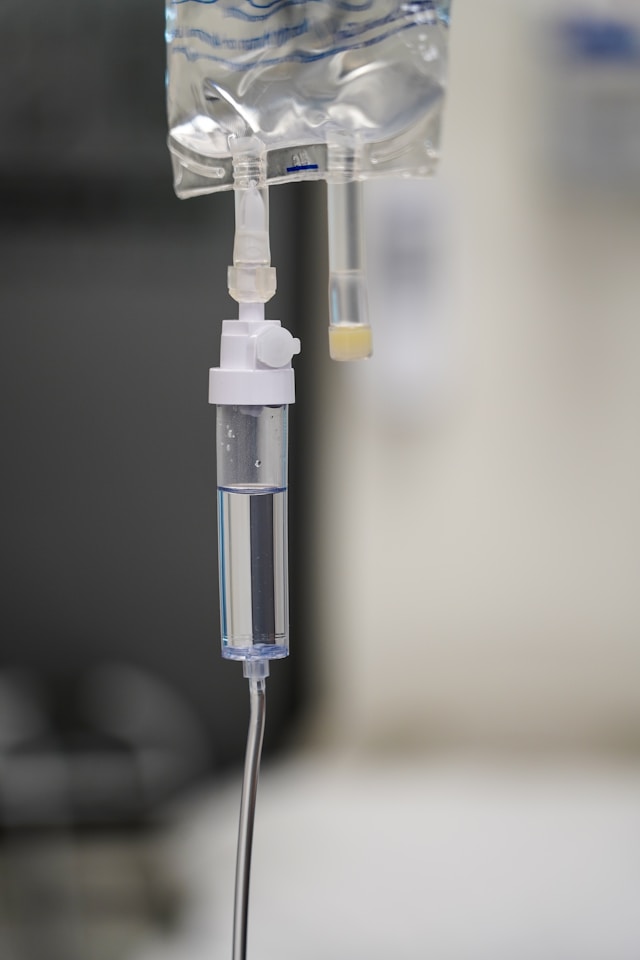
Infusion Therapy for Crohn's Disease


Dr. Chen is a board-certified immunologist with over 15 years of experience treating autoimmune and immunodeficiency disorders. She specializes in IVIG therapy and has published extensively on immune system treatments.
Medical Disclaimer
Crohn's disease is a chronic inflammatory bowel disease (IBD) that causes inflammation anywhere in your digestive tract, from mouth to anus, though it most commonly affects the end of the small intestine and beginning of the colon. When oral medications aren't enough to control inflammation and symptoms, infusion therapy offers powerful treatment options that can induce remission, heal intestinal damage, and dramatically improve quality of life. Understanding how infusion therapy works for Crohn's disease helps you make informed decisions about managing this challenging condition.
Key Highlights
- Biologic infusion therapies for Crohn's target specific inflammatory proteins like TNF-alpha and integrins, often achieving better disease control than traditional medications alone.
- Common infusion medications include Remicade, Entyvio, and Stelara (initial dose), typically given every 4-8 weeks depending on the specific drug.
- Many Crohn's patients achieve clinical remission with infusion therapy, experiencing relief from abdominal pain, diarrhea, and other symptoms while allowing intestinal healing.
Understanding Crohn's Disease
Crohn's disease is an autoimmune condition where your immune system attacks your digestive tract, causing chronic inflammation that can affect all layers of the intestinal wall. This inflammation leads to symptoms including persistent diarrhea, abdominal pain and cramping, blood in stool, fatigue, weight loss, reduced appetite, and fever during flares.
Unlike ulcerative colitis which affects only the colon's innermost lining in a continuous pattern, Crohn's can affect any part of the GI tract and often appears in patches with healthy tissue between inflamed areas. This inflammation can lead to complications including strictures (narrowing), fistulas (abnormal connections between organs), abscesses, malnutrition, and increased colon cancer risk.
According to the Crohn's & Colitis Foundation, approximately 780,000 Americans have Crohn's disease. It typically develops in late teens to early 30s, though it can occur at any age. Smoking, family history, and certain genetic factors increase risk.
Left untreated or poorly controlled, Crohn's can cause irreversible intestinal damage, requiring surgery to remove diseased bowel sections. Aggressive medical treatment aimed at achieving complete remission (mucosal healing) helps prevent these complications.
Why Infusion Therapy for Crohn's Disease
Infusion therapy becomes appropriate for Crohn's management in several situations:
Moderate to Severe Disease: Patients with significant symptoms, extensive inflammation, or complications often need the stronger anti-inflammatory effects that biologic infusions provide.
Failure of Conventional Therapy: When oral medications like 5-ASA drugs, immunomodulators (azathioprine, 6-MP), or corticosteroids don't achieve or maintain remission, biologic infusions offer a more targeted approach.
Steroid Dependency: Many Crohn's patients require repeated courses of corticosteroids to control flares, but long-term steroid use causes serious side effects. Biologics can induce steroid-free remission.
Fistulizing Disease: Crohn's-related fistulas often respond better to biologic therapy than conventional medications, particularly TNF inhibitors like Remicade.
Preventing Surgery: Effective biologic therapy can prevent or delay need for surgical bowel resection by achieving disease control and mucosal healing.
Post-Surgical Prevention: After Crohn's-related surgery, biologics help prevent disease recurrence at surgical sites.
The American Gastroenterological Association recommends considering biologic therapy for Crohn's patients with moderate to severe disease or those who haven't achieved adequate control with conventional treatments.
Common Infusion Medications for Crohn's Disease
Remicade (Infliximab): A TNF-alpha inhibitor that blocks a key inflammatory protein. The most established biologic for Crohn's with over 20 years of use. Given every 8 weeks after loading doses at weeks 0, 2, and 6. Infusions take 2-3 hours initially, potentially shortened with tolerance. Particularly effective for fistulizing Crohn's. According to the Mayo Clinic, Remicade can induce remission in about 60% of Crohn's patients and maintain it in many.
Entyvio (Vedolizumab): A gut-selective integrin blocker that prevents inflammatory cells from entering intestinal tissue. Unlike TNF inhibitors, Entyvio works only in the GI tract, not systemically, which may mean fewer systemic side effects. Given every 8 weeks after loading doses. Infusions take about 30 minutes, one of the quickest biologics. May take longer to show full benefit than TNF inhibitors but excellent for maintaining remission.
Stelara (Ustekinumab): An IL-12/23 inhibitor. The first dose is given as an IV infusion (taking about 1 hour) calculated by body weight, then patients transition to self-injections every 8 weeks at home. Effective for Crohn's patients who haven't responded to or lost response to TNF inhibitors.
Inflectra and Renflexis: Biosimilar versions of Remicade that work identically but may cost less. Given on same schedule as Remicade.
Tysabri (Natalizumab): Used less commonly for Crohn's than for MS, but FDA-approved for moderate to severe Crohn's in patients who haven't responded to other treatments. Given monthly as 1-hour infusions. Carries PML risk, requiring JC virus risk assessment.
What to Expect from Infusion Therapy
Pre-Treatment Evaluation: Before starting biologics, you'll need screening for latent infections (tuberculosis, hepatitis), baseline labs, and possibly imaging to assess disease extent and severity.
Starting Treatment: Loading dose schedules help achieve therapeutic levels quickly. For Remicade, you'll receive infusions at weeks 0, 2, and 6, then every 8 weeks.
Timeline for Improvement: Many Crohn's patients notice symptom improvement within 2-4 weeks of starting infusion therapy. Abdominal pain and diarrhea often decrease first. Complete remission and mucosal healing typically take 3-6 months to achieve. Entyvio may take longer to show full benefit (up to 14 weeks) compared to faster-acting TNF inhibitors.
Combination Therapy: Many patients continue immunomodulators like azathioprine or 6-MP along with infusion biologics, particularly with Remicade, as this combination can be more effective and reduce antibody development against the biologic.
Monitoring Response: Your gastroenterologist tracks response through symptom assessment, inflammatory markers (CRP, fecal calprotectin), and colonoscopy/imaging to assess mucosal healing.
Benefits of Infusion Therapy for Crohn's
Patients responding well to biologic infusions often experience:
Clinical Remission: Significant reduction or elimination of symptoms including abdominal pain, diarrhea, urgency, and bleeding.
Mucosal Healing: Reduction or elimination of inflammation visible on colonoscopy, which correlates with better long-term outcomes and reduced complication risk.
Fistula Closure: Many perianal or abdominal fistulas close or significantly improve with biologic therapy, particularly TNF inhibitors.
Steroid-Free Remission: Ability to discontinue corticosteroids while maintaining disease control, avoiding long-term steroid complications.
Reduced Hospitalizations: Fewer disease flares requiring hospitalization or emergency treatment.
Prevention or Delay of Surgery: Effective medical management may prevent or postpone need for bowel resection surgery.
Improved Nutritional Status: Better nutrient absorption as inflammation resolves and symptoms improve.
Better Quality of Life: Relief from symptoms allows return to work, social activities, and normal daily life without constant bathroom urgency or pain.
Disease Modification: Some biologics may alter disease course long-term, preventing the progressive bowel damage that Crohn's can cause.
The National Institute of Diabetes and Digestive and Kidney Diseases emphasizes that achieving deep remission with mucosal healing provides the best long-term outcomes for Crohn's patients.
Potential Side Effects and Risks
Increased Infection Risk: All biologics suppress immune function, increasing susceptibility to infections including upper respiratory infections, urinary tract infections, and opportunistic infections. Serious infections occur in a small percentage of patients.
Infusion Reactions: Acute reactions during or shortly after infusion can include headache, nausea, rash, itching, or fever. Usually mild and manageable with pre-medications and slower infusion rates.
Tuberculosis Reactivation: Latent TB can reactivate with biologic therapy, requiring screening before treatment and preventive antibiotics if positive.
Liver Enzyme Elevations: Some patients develop elevated liver enzymes, particularly with TNF inhibitors combined with immunomodulators.
Antibody Development: Some patients develop antibodies against biologics (particularly Remicade), which can reduce effectiveness or increase infusion reaction risk. Combination therapy with immunomodulators reduces this risk.
Paradoxical Reactions: Rarely, biologics can cause new autoimmune-type reactions like psoriasis or arthritis.
PML Risk: Tysabri carries risk of progressive multifocal leukoencephalopathy, requiring JC virus risk assessment.
Cancer Considerations: Some studies suggest small increased risk of certain lymphomas with long-term TNF inhibitor use, though absolute risk remains low and must be weighed against benefits.
Your gastroenterologist monitors for these issues through regular appointments, symptom review, and laboratory testing.
Living with Crohn's on Infusion Therapy
Infection Prevention: Practice careful hygiene, avoid sick contacts, stay current on vaccinations (no live vaccines while immunosuppressed), report fevers promptly.
Treatment Adherence: Keep infusion appointments consistently. Missing doses can lead to flares and may increase antibody development risk.
Lifestyle Factors: While not proven to cause Crohn's, stress management, adequate sleep, regular exercise (when feeling well), and avoiding smoking all support better outcomes. Dietary modifications may help manage symptoms though diet doesn't cause or cure Crohn's.
Monitoring Symptoms: Track bowel movements, pain, bleeding, and other symptoms to help your doctor assess disease control and treatment response.
Regular Follow-Up: Maintain scheduled appointments with your gastroenterologist, complete recommended lab work, and undergo periodic colonoscopy as recommended.
Cost and Insurance Considerations
Crohn's biologics are expensive, but financial assistance makes them accessible:
Insurance Coverage: Most plans cover FDA-approved biologics for Crohn's with prior authorization demonstrating inadequate response to conventional therapy.
Copay Assistance: All manufacturers offer copay cards that can reduce costs to $0-50 per infusion for insured patients.
Patient Assistance Programs: Free or low-cost medication for uninsured/underinsured patients meeting income criteria.
Foundation Support: Crohn's & Colitis Foundation and other organizations help connect patients with financial resources.
Frequently Asked Questions
How effective is infusion therapy for Crohn's disease?
Infusion biologics are highly effective for Crohn's. Remicade induces remission in about 60% of patients and maintains it in roughly 40% at one year. Entyvio achieves remission in about 40% of patients with higher maintenance rates. Stelara shows similar effectiveness. Many patients who don't respond to one biologic can achieve remission with a different one. While not everyone responds, biologics represent the most effective medical treatments available for moderate to severe Crohn's.
How long does it take for Crohn's infusion therapy to work?
TNF inhibitors like Remicade often show benefit within 2-4 weeks, with many patients experiencing symptom improvement after just one or two infusions. Full remission and mucosal healing typically take 3-6 months. Entyvio may take longer—up to 14 weeks—to show maximum benefit but works well for maintenance. Stelara falls somewhere between. If you haven't seen any improvement by 12-14 weeks, your doctor may consider switching to a different biologic.
Can you stop infusion therapy once Crohn's is in remission?
Stopping biologic therapy almost always leads to disease relapse within months. Crohn's is a chronic condition requiring ongoing treatment to maintain remission. Some patients who achieve very prolonged deep remission (years) may attempt treatment withdrawal under close monitoring, but this is uncommon and carries high relapse risk. Most Crohn's patients continue maintenance biologic therapy indefinitely to sustain disease control.
What if Remicade or Entyvio stops working for my Crohn's?
Loss of response to biologics can occur due to antibody development or other mechanisms. If your current biologic becomes less effective, options include increasing dose or frequency, adding an immunomodulator to reduce antibody formation, switching to a different biologic with a different mechanism of action, or considering newer therapies. Many biologics are now available for Crohn's, so alternatives exist if one stops working.
Is infusion therapy better than Crohn's surgery?
Infusion therapy and surgery serve different purposes. Biologics are medical treatment aiming to control inflammation and induce remission without surgery. Surgery removes severely damaged bowel sections but doesn't cure Crohn's, which often recurs at surgical sites. The goal is using biologics to avoid or delay surgery. However, when complications like strictures, abscesses, or medication-refractory disease occur, surgery may be necessary and beneficial. Biologics and surgery aren't competing options but complementary approaches in comprehensive Crohn's management.
Hope for Better Disease Control
If you've been prescribed infusion therapy for Crohn's disease, it represents access to powerful treatments that have transformed outcomes for many patients. While Crohn's remains a chronic condition requiring ongoing management, modern biologic therapies allow many patients to achieve and maintain remission, healing their intestines and returning to normal life activities.
With proper treatment and monitoring, living well with Crohn's disease is achievable for most patients.
Ready to explore infusion therapy options for your Crohn's disease? Find infusion centers experienced in IBD treatment near you to begin your journey toward remission.
Medical Disclaimer: This content is for educational purposes only and is not a substitute for professional medical advice, diagnosis, or treatment. Always consult your healthcare provider with questions about your medical condition or treatment options.
Article Statistics


Table of Contents
Article Statistics










